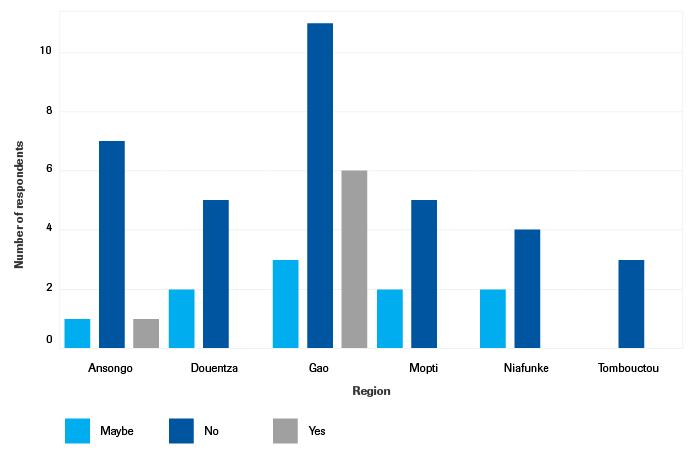Of those respondents who addressed this issue, a majority, including customary justice leaders, believe that customary justice mechanisms are unable to deal with cases related to the recent security crisis (figure 13). One reason is that because customary justice is not officially recognised and endorsed by state authorities and institutions, it does not have the necessary enforcement strength to do so. Another reason is the lack of technical and financial means of customary systems, given that ‘war crimes’ require thorough investigations and technical expertise that traditional leaders do not have. Additionally, people who committed human rights abuses during the security crisis often did so as part of rebel and jihadist groups, and customary leaders find it challenging to handle atrocities committed in that context.
An interviewee from Douentza set up a crisis committee of 12 people, representing each ethnic group, which acted as an intermediary between the population and the jihadists, and which suggests some involvement by customary leaders in a crisis-related political mediation role. In Niafunké, a similar committee was established but, according to one respondent, was at the mercy of the Islamists and therefore powerless. However, another respondent described how the crisis committee there was able to persuade the 'rebels' to return a child and money taken from him to his family, and to prevent them from plundering a merchant's shop.
A minority of respondents believed that customary mechanisms are capable of handling the crimes related to the crisis. One customary leader explained that these crimes could be handled based on the solutions offered by religion, and pointed out that a precept of the Qur’an is that if you kill someone, you will also get killed. Although this could be in contradiction of formal law, he argued that at least the reasoning is not politicised. A second leader explained that they would be capable to handle these cases because if people want a problem to become small, it will become so. A third leader argued that they could handle such cases if they 'were advised.' Others believed that the customary leaders’ ability to bring about social cohesion would work in these cases, especially in a time of peace.

